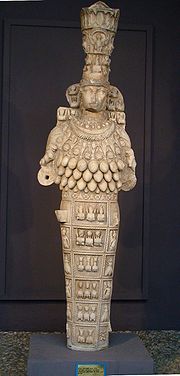
 |
Freethought & Rationalism ArchiveThe archives are read only. |
|
|
#11 | ||
|
Veteran Member
Join Date: Jan 2008
Location: Latin America
Posts: 4,066
|
Quote:
Quote:

|
||
|
|
|
|
#12 | |
|
Veteran Member
Join Date: Sep 2003
Location: On the path of knowledge
Posts: 8,889
|
Quote:
Does the text as given match our historical/archaeological knowledge of the Ephesians's religion? |
|
|
|
|
|
#13 | ||
|
Veteran Member
Join Date: Jan 2007
Location: Mondcivitan Republic
Posts: 2,550
|
Info about the god Artemis (Greek) = Diana (Roman) is in just about every bible dictionary and commentary on Acts you can lay your hand on.
What is peculiar about it? DCH Quote:
|
||
|
|
|
|
#15 | |
|
Veteran Member
Join Date: Sep 2003
Location: On the path of knowledge
Posts: 8,889
|
Quote:
Then there is the matter of Greek and Roman soldiers. On this side the Greeks with Artemis emblazoned upon their shields, calling upon Mighty Zeus for the defense of their ancient and honorable culture. On that side the Roman legions tramping down all with Diana upon their armament, calling upon Jupiter the god of the Romans, for victory and Roman dominion over all men. The beautiful Temple of Artemis, once the pride of the Grecians, reduced to being a brothel for the prostitutes of a foreign fertility goddess. All a matter of what we are the heirs to, and how we perceive history. After all why should we at all give a damn about religious syncretism amongst ancient cultures, having nothing to do with us today... or does it? |
|
|
|
|
|
#16 | ||
|
Veteran Member
Join Date: Jan 2007
Location: Mondcivitan Republic
Posts: 2,550
|
I dunno.
One thing I have noticed is that the Greek text says Artemis while half the time the translation has Diana (KJV, Douay-Rheims, German, Spanish, Portugese, Italian, etc, likely influenced by Latin Vulgate). Usually when cultures collide, the victors decide what aspects of the conquered cultures deserves to be imported into their culture, and on what terms. All the relationships and genealogies the Greeks may have developed for their gods may not get imported into the Roman. They latch onto some aspects of that god that the victor *thinks* was important (sometimes grotesquely misunderstood) and rather arbitrarily equates that god to one in their own pantheon. Greeks and Romans also freely equated Syrian gods with their own: El ("Most High") or Baal = Jupiter, Astarte = Aphrodite, Melqart = Hercules, etc. In Syria and Asia, the god "Most High" was often worshipped outside of its Jewish context. Jewish synagogues in the Hellenistic world did not shy from using these associations when seeking out or honoring pagan patrons, although it could be argued that Jews did not themselves actually equate the gods in their minds. See volume 3.1 of the revised edition of E. Schurer's Jewish People (or via: amazon.co.uk). DCH Quote:
|
||
|
|
|
|
#17 |
|
Veteran Member
Join Date: Sep 2003
Location: On the path of knowledge
Posts: 8,889
|
FWIW my Hebrew NT also has Artemis. (and Zeus) and at Acts 4:12, Zeus and Hermes
|
|
|
|
|
#18 | |
|
Veteran Member
Join Date: Jan 2007
Location: Mondcivitan Republic
Posts: 2,550
|
Quote:
Here are the ISBN numbers for the 4 volumes of the revised edition, well worth hunting for used if you can find them: Emil Schürer (also spelled Schuerer, but usually misspelled by all online book dealers), History of the Jewish People in the Age of Jesus Christ (175 B.C. - A.D. 135), T & T Clark, Edinburgh. [This edition is NOT the 5 volume 1885-1891 English Translation of the 1886-1890 German 2nd edition, but a revision/retranslation based on the "3rd/4th" German edition of 1901-1909). Volume I (ISBN 0 567 02242 0): 1973, A New English Edition, revised and edited by, Geza Vermes & Fergus Millar, Literary Editor Pamela Vermes, Organizing Editor Matthew Black Volume II (ISBN 0 567 02243 9): 1979, A New English Edition, revised and edited by, Geza Vermes, Fergus Millar, Matthew Black, Literary Editor Pamela Vermes, Organizing Editor Matthew Black Volume III.1 (ISBN 0 567 02244 7): 1986, A New English Edition, revised and edited by, Geza Vermes, Fergus Millar, Martin Goodman, Literary Editor Pamela Vermes, Organizing Editor Matthew Black Volume III.2 (ISBN 0 567 09373 5): 1987, A New English Edition, revised and edited by, Geza Vermes, Fergus Millar, Martin Goodman, Literary Editor Pamela Vermes, Organizing Editor Matthew Black This is by far one of the most important sets of volumes in my library. Each volume (I, II, and III.1 + III.2) is unique, but packed with information relating to Jewish history (vol I), Jewish Culture, Political & Social institutions, Messianism (vol II), Jewish-Gentile relationships in the Diaspora, Jewish literature in Hebrew, Aramaic, Greek (vol III.1), and Jewish literature such as Apocrypha & Pseudepigrapha, including some that may by Christian revisions of originally Jewish works, and Philo, and finally a complete index of all volumes (vol III.2) DCH |
|
|
|
|
|
#19 |
|
Contributor
Join Date: Mar 2006
Location: Falls Creek, Oz.
Posts: 11,192
|
|
|
|
|
|
#20 |
|
Veteran Member
Join Date: Sep 2003
Location: On the path of knowledge
Posts: 8,889
|
Not a direct reference to any particular source, rather an personal observation on how the once proud ancient Greek culture, and its greatest Temple became overran and mongrelized under the domination and influence of Rome.
Now hundreds of millions of temples have suffered the same fate. |
|
|
| Thread Tools | Search this Thread |
|